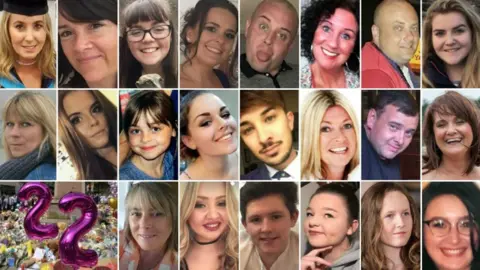Manchester Arena attack inquiry: Survivors refused role
 Family handouts
Family handoutsSurvivors of the Manchester Arena bombing will not be legally represented at the public inquiry after losing their bid to be "core participants".
The hearings, due to begin in September, will examine the background to the attack and emergency responses.
Fifty-six survivors had wanted to play a central part at the inquiry but will not now be represented.
The inquiry chair, Sir John Saunders, said they will still "have a voice", but as witnesses.
"Their voice is an important one and it will be heard," he said in a ruling.
Salman Abedi, 22, detonated a suicide bomb as fans left an Ariana Grande concert at the arena, killing 22 people and injuring hundreds more on 22 May 2017.
His younger brother, Hashem Abedi, 22, was convicted of 22 counts of murder last month at the Old Bailey.
Sir John said: "The injuries, trauma and personal tragedy that the survivors have suffered cannot be overstated and I fully appreciate that this application is borne of the desire of the survivors to ensure that the reasons for the attack are fully understood, the adequacy of the emergency response is examined, and that lessons are learned."
'Critical evidence'
But he said that he thought the inquiry could do that without the survivors having the formal status of "core participants."
"I intend to call survivors who can give relevant evidence as witnesses during the inquiry. As they were at the scene, they may have critical evidence to provide," he said.
"Having suffered such serious injuries, the survivors will want answers as to why the attack happened, whether it could have been prevented, and what lessons can be learned.
"The survivors will be able to raise any concerns with my legal team and identify lines of inquiry that they would wish to have pursued. "
At a preliminary hearing earlier this month, Brenda Campbell QC had argued in favour of granting the "living witnesses" core participant status.
"They were, in the main, in the City Room [arena foyer] before, during and after the attack and mercifully they have lived to tell the tale."
But the move was opposed by some bereaved families and by counsel to the inquiry Paul Greaney QC, who said that it could prolong the hearings.
Sir John said he had reached his decision because the inquiry was essentially a replacement for the inquests.
